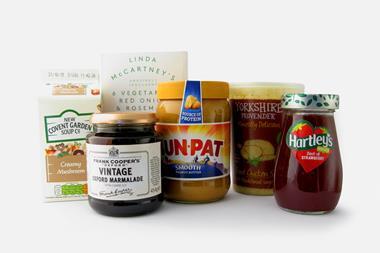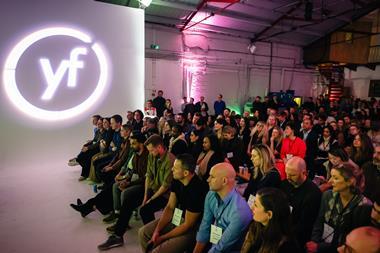More and more food entrepreneurs are courting the Dragons in the hope of winning financial backing – and even those who leave the Den empty-handed can find it a life-changing experience. Samantha Lyster reports
It’s “worth a punt”. These were the words with which Peter Jones helped launch a £30m food brand.
Of all the products that have entered the BBC’s Dragons’ Den now in its ninth series it is Levi Roots’ Reggae Reggae Sauce that has acquired the status of legend. The brand has spun off into everything from frozen food to fizzy drinks and it will launch in the US next year.
Roots isn’t the only food entrepreneur to have benefited from chasing a share of the Dragons’ wealth. A whole host of new food and drink brands are now lining supermarket shelves thanks to the Dragons.
And plenty more will be queuing up to chance their arm this series the universality of food and drink makes it one of the most popular categories with the show’s viewers, who numbered a record 4.3m when series nine launched two weeks ago, says the BBC. But is attracting a Dragon’s backing really the be all and end all?
For some, the prize of national exposure, a hefty cash injection and a wealth of expertise can quite simply be life changing. The Dragons enable many smaller players to kick open doors that might otherwise have been closed to them. Levi Roots, who won the backing of Peter Jones and fellow Dragon Richard Farleigh in 2006, says he had already been in talks with retailers, but having Dragons on board helped speed things up.
“Without the support of Peter Jones it would have been a lot harder and it would have taken longer,” he says.
The £50,000 he secured from the Dragons also helped him get around the problem of minimal available credit, allowing him to expand. “I had tried to get backing from my bank manager to help launch the sauce, but he really wasn’t interested,” he recalls. “The banks are very prepared to lend money to people who have money, but not so keen when you really need help.”
Jones adds that it doesn’t just benefit the businesses that attract the investment it can also fuel the growth of entire categories. The success of Reggae Reggae Sauce proved to the supermarkets that there was room for more world food brands on their shelves, he argues.
“Before Levi appeared on the show, I can’t remember seeing any major products with a Caribbean theme. Now there are lots of brands trying to benefit from the consumer’s interest in this category,” he says. “In 2007, I can remember being told we’d be lucky to sell 100,000 bottles we’re now around the 15 million mark so of course there’s interest in what will come next.”
Whether they invest or not, the publicity of getting to even speak to the Dragons can be priceless. “A lot of the food and drink businesses on the show were already producing on a small scale,” says Jane Milton, who heads up the consultancy Not Just Food.
After they appear on the show, hopefuls often enjoy a huge boost in awareness that makes it much easier to accelerate their plans regardless of the reception they get from the Dragons. In fact, some have gone on to far surpass what they were hoping to achieve even though they failed to get any backing from the Dragons.
James Nash, founder of Wine Innovations, is one such entrepreneur. His hope of attracting £250,000 for 25% of his business to help him fulfil a potential order from M&S for his Le Froglet individual wine goblet servings were dashed in series seven. Nevertheless, he went on to attract an even better deal £250,000 for 20% thanks to the show’s global reach.
“I needed cashflow to buy in the goblets,” says Nash. “I didn’t get backing from the Dragons, but a private investor was watching the show in Spain and he contacted me. We’re now in talks with manufacturers in Australia, New Zealand and America to license the product.”
Stepping into the Den is not without its risks, of course. “It is a TV show and people have to be aware that the producers are going to want some people who won’t look good in front of the cameras,” warns Milton. And incurring the Dragons’ wrath in front of millions of viewers is not a comfortable position for any business.
Indeed, that’s the position Joe Reade found himself in during series seven. Reade, who runs Isle of Mull-based Island Bakery Biscuits, left the Den with his ears ringing after the Dragons dismissed his appeal for investment in a new bakery but he insists the appearance on the show did not significantly harm his business, which eventually secured funding from Dutch ethical lender Triodos Bank.
His pride, however, did end up a little bruised. Reade says he suffered the ire and derision of the Dragons because Duncan Bannatyne miscalculated the floor space of the factory by a factor of 10.
“They thought I was aiming at becoming Mr McVitie in one fell swoop,” he says. “I wasn’t quick enough to spot his error and was laughed off the set. They all said very complimentary things about the products, but not much of that made it on to the show.”
Jeremy Benson was also sent packing from the Den after he failed to attract £100,000 for 10% of his apple juice company to help fund the marketing of his frozen fruit lolly, Chilly Billy. Yet he shrugged off the rejection and carried on, eventually getting his break through a chance encounter at a farmers’ market.
“The buyer for Nando’s was shopping and when she saw the product she saw it would fit with the restaurant’s corporate social responsibility,” says Benson, who now supplies Pizza Hut and The Co-operative Group, as well as the Nando’s chain.
So there certainly is life after a battering in the Den and for those with tough skin and a sound idea there’s even the chance to soar above initial aspirations. That said, getting the backing of a Dragon doesn’t tend to do any harm. “The great thing about the show and working with the Dragons generally is the connections, experience and funding that can transform products with little chance of making it from a standing start,” says Jones, who adds that he has no regrets about the propositions he has or hasn’t backed.
Which is surprising, given that Jones invested £75,000 in wannabe rock band Hamfatter in 2008. We’ve only heard a few discordant peeps out of them since.
Where are they now?
Le froglet - “We’re out”
The one that got away. James Nash wanted a cool quarter million for 25% of his company Wine Innovations, producer of Le Froglet sealed single-serve wine goblets. The Dragons may have sent him packing without a penny, but later a cannier viewer stumped up the cash for just 20% of the business.
Nash is now selling £2m worth a year through M&S, Whistle Stop station stores, Vue Cinemas and music festivals. He’s projecting annual sales of between £7m and £12m by 2013 and is negotiating franchise and manufacturing plant deals around the world.
ReggaeReggae sauce - “We’re in”
One-time jailbird Levi Roots is today worth an estimated £30m. He has Dragons Peter Jones and Richard Farleigh, who stumped up £50,000 for 40% of his Reggae Reggae brand, to thank for much of that.
Now he’s knocking out more spin-offs than Viv Richards in his heyday, with recent brand extensions including Rasta Pasta, Reggae Reggae Groove Cut Crisps and a link-up with Domino’s Pizza. The dreadlocked millionaire, who is also a TV chef, is planning to launch his brand in the States next year through AP Foods.
Chilly Billy - “We’re out”
Chilly Billy ice lollies got a frosty reception from the Dragons. Jeremy Benson wanted £100,000 for 10% of his apple juice company to help fund the marketing campaign for Chilly Billy. Despite the lollies being free from added sugars and containing 97% English apples - putting them bang on trend in terms of provenance and health - Benson left the Den empty-handed.
But it was the Dragons’ loss, he says. Since beating a hasty retreat from the Den, he’s won listings with Nando’s, Pizza Hut, The Co-operative Group and National Trust cafés.
Worthenshaws Freedom - “We’re in”
The Dragons were falling over themselves to do a deal with Kirsty Henshaw when she entered the Den to sell a stake in her free-from desserts business. In the end it was Duncan Bannatyne and Peter Jones who prevailed, paying £65,000 for a 30% stake in her Worthenshaws Freedom brand.
The range is now stocked in all the major supermarkets as well as independent retailers and restaurants. Earlier this month, Henshaw launched two new milk alternative lines, Freedom Oat and Rice Drinks.
Island Bakery - “We’re out”
Joe Reade got mauled by the Dragons when he entered the Den trying to flog 10% of his bakery business for £100,000. He wanted the cash to build a new bakery that would help him step up production to meet growing demand for his biscuits, but none of the Dragons would bite.
Reade did it without them. The new facility - funded by Dutch community bank Triodos - opens next year. He says it will allow him to triple his current output of 250,000 biscuits a week, sold through 8,000 outlets, and could double turnover to £2m within the year.
Pebblebed Vineyards - “We’re in”
It’s not easy to make Duncan Bannatyne smile. But that’s what Geoff Bowen did when he went before the Dragons to pitch his innovative wine co-operative idea. Bowen offers wine lovers a share in his vineyard for a lump sum of £2,000, but instead of being paid back with cash they are rewarded with wine produced from the vines they have helped fund.
Bannatyne forked out £60,000 for 20% of the business, which has since become a great success, with Bowen expanding the scheme to include wine tours.



















No comments yet